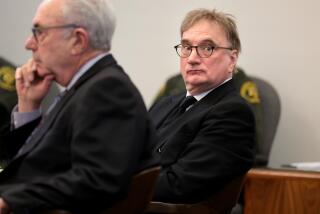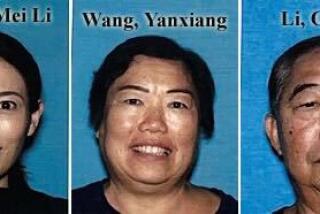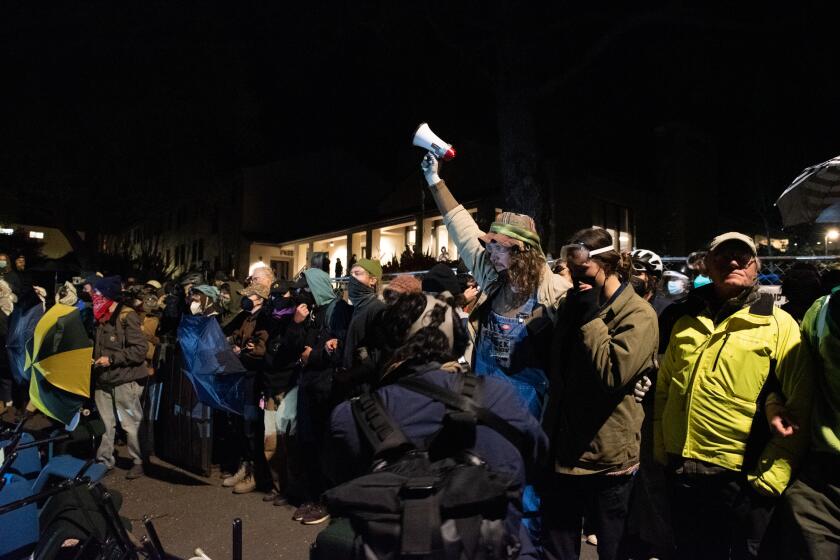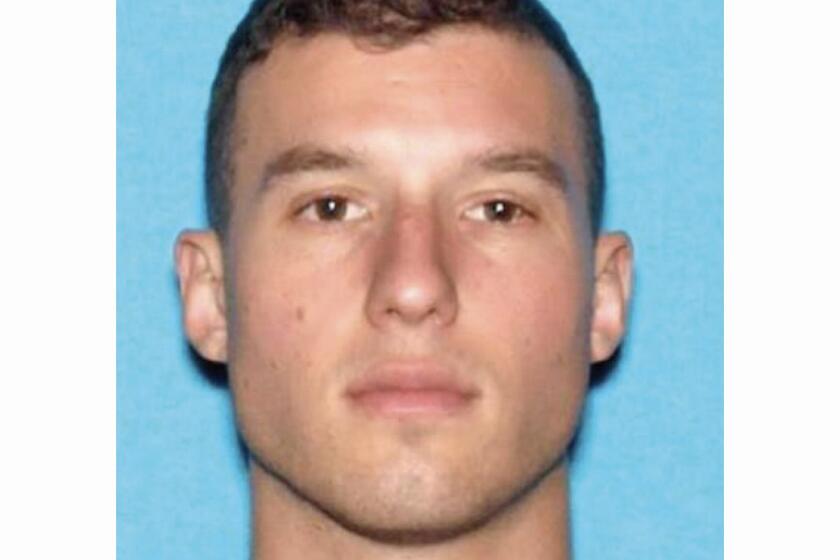Man accused of killing wife is found dead, ending 15-year saga: ‘We weren’t able to get this done’
Charlotte Cole’s killer took her life but left everything else behind.
The 50-year-old woman was not sexually assaulted, and the assailant didn’t snatch her purse, cash or credit cards.
Found Sept. 1, 2001, in her car behind an Arcadia restaurant, her body had more than 20 stab wounds. Prosecutors said the killer had one goal: death.
It took investigators more than a decade to build a strong enough case to file a murder charge against her husband, Richard Keith Cole, a community college instructor.
After years of hurdles, a trial was scheduled for early 2017. But the case came to an abrupt halt on Dec. 6 when Richard Cole died at the age of 76. No foul play in his death is suspected.
On Tuesday, Los Angeles County Superior Court Judge Suzette Clover dismissed the pending murder charge.
“I am very disappointed. I feel very badly that we weren’t able to get this done,” Deputy Dist. Atty. John Lewin told The Times in a telephone interview.
Lewin, a prosecutor specializing in circumstantial evidence, helped revive the investigation into Charlotte Cole’s death and worked on the case since around 2006.
“When you commit a crime like this, your legacy should be that you are branded and designated a killer,” Lewin said. “It bothers me that a jury was never able to come back with that determination.”
From the outset, Richard Cole was considered a “person of interest” in his wife’s death, L.A. County sheriff’s Lt. Wes Sutton said in a statement.
But the case grew cold. Arcadia police announced a reward, and then-Gov. Arnold Schwarzenegger also offered up to $50,000 for information leading to the arrest and conviction of Charlotte Cole’s killer.
Meanwhile, detectives scoured the prior investigation’s course and searched Richard Cole’s home. Lewin said they built a case that was “overwhelmingly circumstantial,” but strong enough to file a murder charge on Oct. 30, 2012.
The evidence included a stain from inside Richard Cole’s car, which DNA analysis indicated was a mixture of blood from him and his wife. Yet investigators learned that Charlotte Cole was almost never inside the car, Lewin said.
When police responded to Richard Cole’s home after the killing, they saw his car race down the road and speed into the driveway, Lewin said. Police forced their way into the home and found him showering — although his two children told authorities he never took showers after returning home.
Other parts of his account didn’t add up, prosecutors said. On the day of the killing, he told police he was cleaning the house — but his kids said he rarely did so. He recounted his errands but left a roughly four-hour gap, and later said he was working at Mount San Antonio College.
Yet his daughter found it laughable that her father visited campus over the Labor Day weekend, telling police she had graded his papers in high school. Weekend visits were out of the question.
“He didn’t care enough about his job to go to school,” Lewin added.
Richard Cole also had injuries but told police that scabs on his prior wounds had reopened. However, a nurse who previously treated him said the wounds were new, Lewin said.
The clincher in the investigation was a stroke of luck. One night in 2012, a detective approached a woman at a bar while a football game played on TV.
The detective introduced himself, and the woman informed him she taught at Mount SAC. He asked whether she knew Richard Cole. She did — she had shared an office with him and was traveling abroad around the time of the slaying.
But she revealed an anecdote from another professor that proved pivotal. Around the time Charlotte Cole was killed, a colleague walked into the faculty restroom and spotted the signature shoes and briefcase of Richard Cole.
Not knowing another person was listening, Richard Cole said words to the effect of, “You did it. They will never know. You fooled them.”
The professor interpreted it as a confession and told at least two others about the incident. Investigators were stunned when they caught wind of the account, more than a decade after the killing, and moved quickly to interview the professor and those who listened to his account.
“We had never heard this before,” Lewin said of the bathroom eavesdrop. “When you add all that stuff up, it was an overwhelming case.”
Richard Cole had pleaded not guilty and was released after posting $1 million bail. If convicted, Cole would have faced 26 years to life in state prison.
His attorney, Anthony Robusto, said he was uncertain about how his client died but stated that the case against him was thin and built mostly on circumstantial evidence.
Lewin said he was sorry he could not put Richard Cole on trial and acknowledged conflicting sentiments over the untimely ending of a tedious, years-long effort by Arcadia police and the Los Angeles County Sheriff’s Department.
The upside: Charlotte Cole’s two children were spared the burden of giving damaging testimony about their father, Lewin said.
“On the other hand, the victim’s sister pushed this case from the start and really wanted to see justice done,” Lewin added. “I feel terrible that we weren’t able to make it happen.”
Twitter: @MattHjourno.
UPDATES:
Dec. 15, 7:55 a.m.: This article was updated throughout with additional details and comments from Deputy Dist. Atty. John Lewin.
This article was originally published at 10:30 p.m. Dec. 14.
More to Read
Start your day right
Sign up for Essential California for news, features and recommendations from the L.A. Times and beyond in your inbox six days a week.
You may occasionally receive promotional content from the Los Angeles Times.







